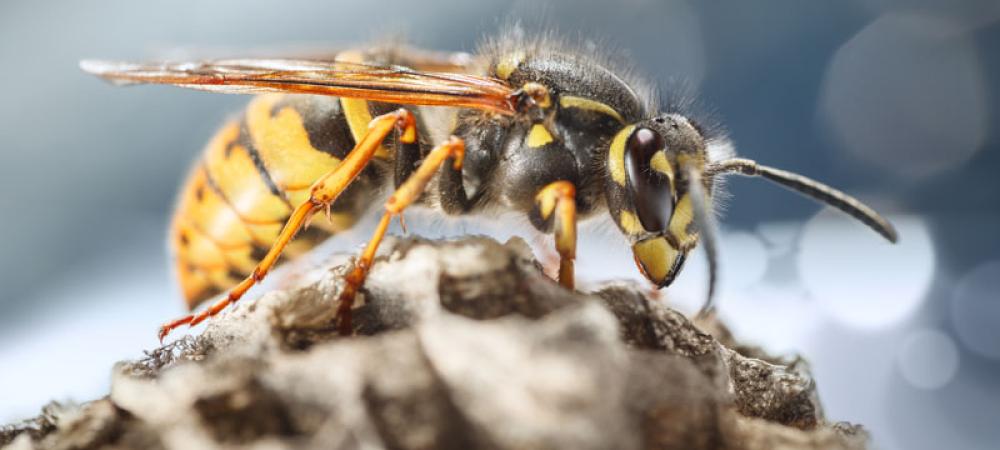Types of Wasps in North Carolina

Wasps play a crucial role in maintaining the ecological balance while often striking fear into the hearts of humans. North Carolina, with its rich biodiversity, is home to a variety of wasp species, each with its unique characteristics and behaviors. Here are the 5 most common different types of wasps in North Carolina:
1. Paper Wasps
Paper wasps are known for their intricate nests made from chewed plant fibers mixed with saliva, which gives the nest a paper-like texture. They are generally not aggressive unless their nest is threatened, and they play a role in controlling pest populations.
Characteristics:
- Slender bodies with long legs
- Usually black, brown, or reddish with yellow markings
- Elongated wings that fold longitudinally at rest
Behavior:
- Solitary or small colony nesters
- Capture caterpillars and insects to feed their larvae
- Important pollinators
2. Mud Daubers
Mud daubers are solitary wasps that build distinctive mud nests. They are not usually aggressive and are valued for their ability to control spider populations around homes and gardens.
Characteristics:
- Slender with a narrow waist
- Usually black or metallic blue with pale markings
- Long thread-like antennae
Behavior:
- Construct tube-like mud nests
- Paralyze spiders and lay eggs on them
- Excellent pest control agents
3. Yellowjackets
Yellowjackets are known for their aggressive behavior and can be a nuisance at picnics and outdoor events. They build large nests and can sting repeatedly when they perceive a threat. Despite their aggressive behavior, yellowjackets actually still play a beneficial role in controlling pest populations.
Characteristics:
- Black and yellow striped pattern
- Rounded bodies with a stout appearance
- Wings are held laterally when at rest
Behavior:
- Social insects living in colonies
- Nest in the ground, logs, or aerial locations
- Omnivorous, scavenging on human food
4. Cicada Killers
Cicada killers are solitary wasps known for their impressive size and hunting habits. As the name suggests, these wasps eat cicadas. Despite their intimidating size, they are not particularly aggressive toward humans.
Characteristics:
- Large, robust bodies
- Black or reddish-brown with yellow markings
- Clear wings with dark veins
Behavior:
- Hunt cicadas for food
- Construct burrows in sandy or loose soil
- Females paralyze cicadas to provide live food for their larvae
5. Potter Wasps
Potter wasps are solitary insects named after their unique clay pot-like nests. They are diverse in appearance and behavior, and they are important pollinators and predators of caterpillars.
Characteristics:
- Variable in size and coloration
- Elongated bodies with a constricted waist
- Distinctive, urn-shaped nests
Behavior:
- Build individual mud nests on surfaces
- Capture caterpillars and spiders to provision nests
- Generally non-aggressive toward humans
Call Wolfpack For Stinging Insect Control
While wasps do control populations of other nuisance pests, they can still be threatening to humans, especially if you’re allergic to their venom. If you need help removing wasps or any other stinging insect, call Wolfpack! We provide wasp removal services in North Carolina that you can count on. Get your free quote today.
Frequently Asked Questions
How Do You Kill a Wasp?
To kill a wasp, you can use a commercial wasp spray that is designed to eliminate them from a safe distance. It's important to follow the instructions on the spray's label and aim accurately to minimize the risk to yourself and others. Keep in mind that if the wasp nest is large or located in a hard-to-reach area, it might be safer to consult a professional pest control service to handle the situation.
How Long Does a Wasp Live?
Generally, worker wasps live for a few weeks to a few months, while queen wasps can live for several months to a year or more. Some species have shorter lifespans, while others, like overwintering queens, can survive for an extended period by hibernating during colder months.
What Do Wasps Eat?
Wasps are carnivores and primarily feed on other insects, spiders, and even nectar. Some species of wasps also scavenge for sugary substances like fruit juices and honeydew produced by aphids.
